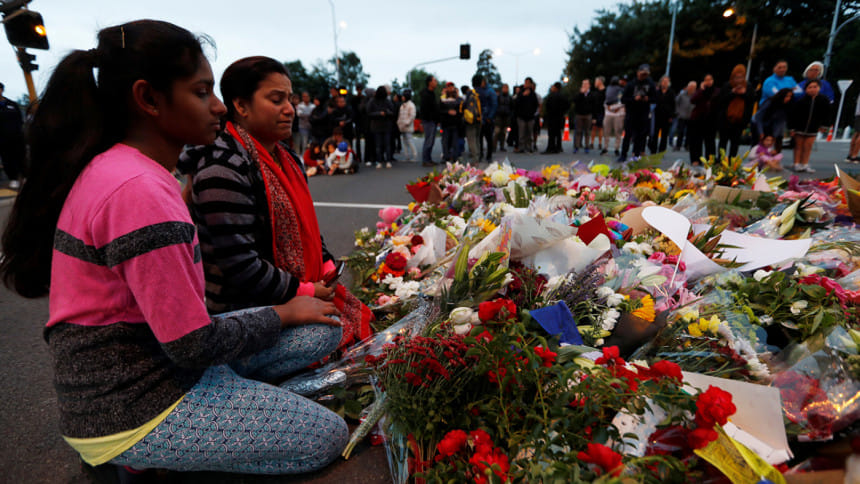Death toll rises to 50 as NZ mourns victims

The death toll from horrifying shootings at two mosques in New Zealand rose to 50, police said Sunday, as Christchurch residents flocked to memorial sites and churches across the city Sunday to lay flowers and mourn the victims.
The additional death was discovered as bodies were being removed from the mosques in the southern city, police said, with forensic officers from across New Zealand flying into the city to assist with the identification process.
The outpouring of grief and support came a day after the right-wing extremist charged over the horrifying attacks on New Zealand mosques flashed a white power gesture as he appeared in court.
Australia-born Brenton Tarrant stood largely impassive in the dock wearing handcuffs and a white prison smock, as the judge read the first of what are expected to be a host of murder charges he is likely to face.
Flanked by armed police, the 28-year-old former personal fitness trainer gestured an upside-down "okay" -- a symbol used by white power groups worldwide.
He did not request bail and was remanded in custody until an April 5 court appearance.
Another man arrested on Friday will appear in court on Monday on charges that are "tangential" to the attacks, though he was not believed to be involved in the shootings, Police Commissioner Mike Bush told reporters Sunday.
Two other suspects arrested at a police cordon during the attacks when a firearm was found in their car were not directly involved in Tarrant's assault, he added.
One of the two, a woman, has been released, and a man remains in custody on firearms charges, Bush said.
"At this moment, only one person has been charged in relation to these attacks," he said.
"I will not be saying anything conclusive until we are absolutely convinced as to how many people were involved. But we hope to be able to give that advice over the next few days."
Fifty people were wounded in the carnage, and doctors have worked round the clock to treat the 36 people still in hospital for gunshot wounds and other injuries sustained in the attacks.
The injured included a two-year-old boy and a four-year-old girl, who was in critical condition.
The attack on the Al Noor and Linwood mosques has shaken this usually peaceful country, which prides itself on welcoming refugees fleeing violence or persecution.
An imam who was leading prayers at the Linwood mosque at the time of the attack said the Muslim community would not be shaken by the massacre.
"It was a very bad day, not just all of us, all of New Zealand," said Ibrahim Abdulhalim. But, he added: "We still love this country".
Across New Zealand, Kiwis responded with interfaith solidarity.
Large crowds in Christchurch, many carrying bouquets of flowers, headed to memorials Sunday to share messages of love to the victims and their families.
"We stand together with our Muslim brothers & sisters" were the words on a large-red banner above a sea of flowers at one of the sites.
Muslims make up just one percent of New Zealand's population.
'I am with you'
Prime Minister Jacinda Ardern arrived in the city on Saturday and, wearing a black headscarf, met with survivors and victims' families.
Ardern said the victims came from across the Muslim world, with Turkey, Bangladesh, and Malaysia among the countries rendering consular assistance.
At least one Saudi citizen, one Indonesian, four Jordanians and six Pakistanis were among the dead.
Sahra Ahmed, a New Zealander of Somali origin, said she was touched by the PM's gesture.
"It means a lot. It is a signal to say -- I am with you," she told AFP.
Police are now trying to piece together answers to the difficult questions of why and how this happened.
They want to know how it was possible for the perpetrator to remain undetected by the intelligence services despite his extremist views.
Ardern said the shooter was "in possession of a gun licence" obtained in November 2017, and he started legally purchasing two semi-automatic weapons, reportedly AR-15s, two shotguns and a lever-action gun the following month.
Ardern said some of the guns had been modified to make them deadlier.
"I can tell you one thing right now -- our gun laws will change," she said.
The suspect documented his radicalisation and two years of preparations in a lengthy, meandering and conspiracy-filled far-right "manifesto".
He live-streamed footage of himself going room-to-room, victim to victim, shooting the wounded from close range as they struggled to crawl away in the main Christchurch mosque.
Thirty-six minutes after the police received the first call, Tarrant was in custody.
'Horrible massacre'
Revulsion at the attack, and tributes to the victims poured in from around the world, including from Pope Francis and Britain's Queen Elizabeth II.
US President Donald Trump condemned the "horrible massacre" in which "innocent people have so senselessly died", but denied that the problem of right-wing extremism was widespread.
Australian police said they had visited Tarrant's childhood home in the town of Grafton, north of Sydney, and spoken to family members as part of their investigation.
The attack has prompted searching questions about whether right-wing extremism has been treated with enough seriousness by Western governments.
Ali Soufan, a former high-ranking FBI counter-terrorism agent, warned the West was "in the midst of a surge of right-wing terrorism that has been metastasising in plain sight while generating only a muted response from domestic counter-terrorism authorities".
Ardern said she "asked our agencies this morning to work swiftly on assessing whether there was any activity on social media or otherwise, that should have triggered a response".

 For all latest news, follow The Daily Star's Google News channel.
For all latest news, follow The Daily Star's Google News channel. 





Comments